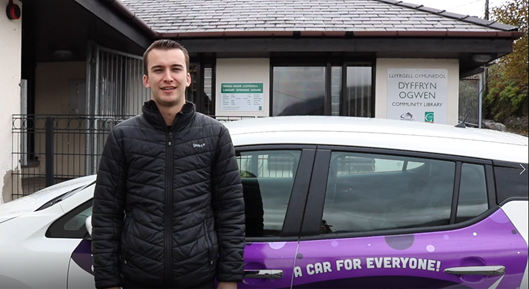Christian Graham28 Jan 2021
Following my post on how an electric vehicle catalysed a wider green transformation in the North Wales community of Dyffryn Ogwen, I wanted to find out more about the origins of the initial car sharing scheme, how it had gone and whether there were useful learnings for people thinking about whether it could work for them.
I caught up with Rhys Gwilym, the Senior Officer at MenterMôn who is responsible for Arloesi Gwynedd Wledig – a series of community electric car pilots in Gwynedd.
What inspired the scheme?
There were two elements initially. How to solve the twin problems of rural loneliness and patchy public transport in Wales – and find a sustainable solution?
We had seen the electric car Renault Twizzy in action and been quite taken with the idea of using it to provide greener community transport. But it soon became obvious that a car that could only transport one person didn’t make a whole lot of sense, so we began to consider more conventional car options.
This morphed into two aims for the pilot project:
- Give communities the chance to try a car-sharing scheme in their area and see if it can be turned into a viable business model.
- Raise awareness of sustainable transport options like electric cars and car sharing. Also see if we can’t dispel a few myths like range anxiety along the way.
The scheme works by loaning one car each to two communities per year, together with all of the booking infrastructure and other support, so they can experiment and see what works for them.
What were some of the main barriers you had to overcome to get the scheme up and running?
Getting the cars
Getting the cars was probably one of the biggest, but we eventually settled on partnering with Co-wheels who’ve been enormously helpful. But having multiple parties in the mix - ourselves, Co-wheels and the groups running the scheme in their community has sometimes caused confusion – particularly around sign up.
Recruiting volunteer drivers
Another barrier seems to have been finding volunteer drivers. We’re not exactly sure why that is, but perhaps it’sto do with lack of familiarity with electric cars.
Lastly, a lot of people aren’t really sure what a community car is or how they can benefit. I always tell them it’s a car for the community to use in whichever way that suits them.
So you’ve got two cars in two communities, one of which is Bethesda – what happened next?
We launched the cars in November 2019 and things were going great. We had a steady number of bookings totalling around 200 in the first few months and the longest single trip was over 500 miles.
Then, of course, COVID-19 hit and we had to lock the cars as a precaution while we decided what we were going to do. Partneriaeth Ogwen in Bethesda then thought they could use their car to connect local suppliers with vulnerable people in the area to supply essential goods. They set up an ordering and delivery service – Cadwyn Ogwen – which now includes hot meals. Their scheme was covered on S4C and got a lot of attention on social media. It was a great example of a group reacting to crisis and finding a way to support their community’s needs.
What else has been a success?
Benefits to the group
A great discovery was that the portion of the hire fees going to back to the community covered their running costs – and is potentially a source of revenue for the group if the car is being charged by renewable energy sources, like solar panels.
Connecting on social media
On the community side of things, it also turns out that Facebook has been a real benefit in encouraging grassroots advocacy. Our early events saw lots of local enthusiasts and a number of EV owners emerge from the woodwork enabling us to make new connections.. Later, users of the cars would often share their own experiences and delight on the car’s Facebook page. At least one of them decided to buy an electric car themselves!
Do you have any advice for aspiring community car sharing schemes?
Get your admin right from the start
Getting the booking system, logistics and coordination of the volunteers administrating the scheme right is absolutely key to success. It needs to be tip-top.
Tell people about it
Otherwise, make sure you promote the car and the scheme. There’s a lot of natural curiosity and try to build that by encouraging users to talk about their experiences on social media as well as with friends and family.
Where to find support
Finally, talk to your community and councillors to try to figure out sources of support and what your community’s needs are.
Lastly - anything else?
Our pilot schemes are finishing in November 2021 and we like to think something will come out of it.
If you’ve got any questions about our scheme and other work, please do get in touch. We’ve had so much interest I’ve dealt with queries from across the UK – even as far as the Isles of Scilly. You can also download our first year report on the scheme from our website.
Thank you, Rhys. It’s been fantastic to hear all about how this scheme moved from an idea to practical reality. Good luck with your next steps.



